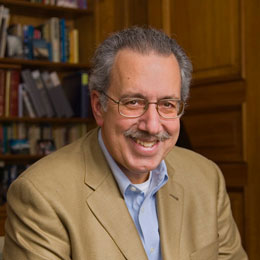 Last fall, Distinguished University Professor Richard Boyatzis was named one of the top 10 influential thinkers around the globe. This spring, he will share his insight with the world when his massive open online course, or MOOC, launches May 1.
Last fall, Distinguished University Professor Richard Boyatzis was named one of the top 10 influential thinkers around the globe. This spring, he will share his insight with the world when his massive open online course, or MOOC, launches May 1.
More than 50,000 people—and counting—have signed up for Boyatzis’ free MOOC, titled “Inspiring Leadership Through Emotional Intelligence.” In the course, Boyatzis aims to teach students of all ages how emotional intelligence can complement analytic tasks as well as invoke curiosity and openness in their lives.
Plus, he noted, “leadership affects us all—and from the research, it looks like many people in leadership positions are not adding much value.” So through the six-week, nine-class program, Boyatzis hopes to teach students how to develop leadership skills and establish “resonance,” a deep emotional connection with others, through topics such as:
- Resonant leadership and the neuroscience behind it
- Renewal as an antidote to chronic stress
- Inspiring and motivating sustained development growth and learning.
Boyatzis teaches many of these same topics inside the classroom at the Weatherhead School of Management, where he is the H.R. Horvitz Professor in Family Business and a professor of organizational behavior. But through a MOOC, he can reach individuals around the world—many of whom do not have the resources to attend school full time.
“The democratizing effect of a free MOOC is quite appealing,” Boyatzis said. “Students can take it even if they live in areas of the world—or even this country—in which they cannot afford a textbook.”
Reaching such a vast, varied audience allows him to experiment with new methods to improve his teaching style. Even more, MOOCs could change the entire philosophy behind “typical” higher education, he said.
MOOCs “can provoke us to experiment,” Boyatzis said. “For example, MOOCs or related pedagogy might enable us to move some segments of our developmental experiences and courses to [other] experiences and preserve class time for discussion and debate—or maybe even reduce the duration of time spent in a degree program.”
While such a change likely wouldn’t free up any extra time for Boyatzis (he’s regularly busy in the classroom or holding additional appointments in psychology and cognitive science), he certainly could use some more free time to enjoy his varied hobbies.
The New York Times bestselling author enjoys traveling “to exotic places with great food and wine” with his wife, Sandy, as well as reading (fiction is preferable), listening to music (jazz, rock and opera are among his favorites) and investing in the stock market (he does teach in the business school, after all). He even polishes rocks for fun; more on that in question No. 4.
What else should you know about him? Find out in this week’s five questions—and then sign up for his class at www.coursera.org/casewestern.
1. What was the first album you ever purchased, and what was the medium (record, cassette, CD, etc.)?
The Incredible Jazz Guitar of Wes Montgomery, in 1960 as an LP.
2. What do you think should have won “Best Picture” at the Oscars—whether or not it was nominated?
The Best Exotic Marigold Hotel
3. What moment at Case Western Reserve stands out as most memorable (so far)?
In 1993, when analyzing the longitudinal data from the first full-time MBA cohort that went through the new, competency-based curriculum, we discovered that at the Weatherhead School of Management we were, finally, adding significant value on the competencies that distinguish effective managers and leaders. This was dramatically better than earlier baseline results with MBAs in cohorts from 1987 to 1989.
We had succeeded in helping our students in a way that no MBA program to date had shown impact, and we found we could help adults develop these vital competencies in leadership.
4. What is one thing people would be surprised to learn about you?
I am a nerd and practice refining my nerdiness—although my wife would say that anyone who works with me knows this—through my hobbies like jewelry making and bird watching.
And I love rock polishing. When I was single, I would go out fossil hunting. I noticed how different the rocks are, and on beaches they are somewhat polished from the sea. After that, I was intrigued with rocks found in other settings. It is a way of preserving a piece of nature. My wife and I have spent a lot of time on beaches around the world, so we have bowls filled with some of these finished, polished rocks from specific places, like Santorini, Greece, Northern Maine islands, Assisi and more.
5. What is your favorite thing about Case Western Reserve?
The possibility of working with faculty and staff across departments, schools and disciplines—including working with the hospitals.
